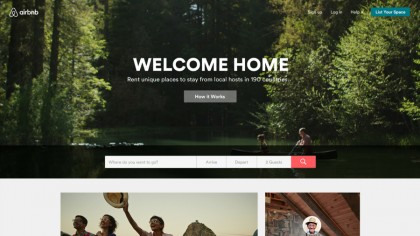Is politics being privatised by tech giants like Uber?
Or is the new 'sharing economy' itself DOA?
Who hates the sharing economy, and why?
Some worry that these new business models mean only one thing: exploitation to cut business costs. "These new economies are creating new definitions of what an employee is, often with no legal standard," says Bridges. "So-called employees are being defined as contractors, freelancers and co-workers, and losing out on many typical employment benefits." Work for one of these companies and you can wave goodbye to minimum wage, health benefits, lunch breaks, annual leave, sick pay and overtime.
"Companies such as Uber, Airbnb, Etsy and JustPark do not take responsibility for their workforce, treating them as independent contractors even though the companies would not exist without their labour," says Bridges.
Companies at the forefront of the sharing economy have been accused of 'corporate nullification', and of flouting laws – especially employment law that has been constructed over decades to protect people. "The era of capitalism could very well be at its end," according to Bridges.

Does it matter if we let tech companies shape social policy?
"We've entered an age when technology companies hold far more power," says French Caldwell, chief evangelist of governance, risk and compliance at software firm MetricStream. "Whether it's Google and the 'right to be forgotten' issue, or Uber and its worldwide clashes with regulators and governments, the largest tech companies now have a lot of influence."
Caldwell blames the sheer speed of Uber's development; its business model just didn't fit within existing legislation, and by the time regulators reacted it had the public support and – crucially – the revenue to lobby against reactive laws.

Are tech firms' radical business models now at the mercy of politicians?
Employment law needs to adapt, and fast, because Uber et al are not going away. But 'sharing companies' also need to get real. "Many are classing themselves as technology companies, but they are actually car services, cleaning services or courier services," says Bridges, "and the misrepresentation is allowing them to avoid certain legal obligations."
However, the end result is a mixed bag, with the likes of Uber operating differently in specific countries. "Being able to fight back hasn't completely worked in Uber's favour, with governments such as Spain's protecting the status quo and simply banning it from operating," says Caldwell, though he also notes that in New York City, politicians who initially backed taxi companies and their drivers have caved to the pressure of all the riders and drivers who have adopted Uber.
Are you a pro? Subscribe to our newsletter
Sign up to the TechRadar Pro newsletter to get all the top news, opinion, features and guidance your business needs to succeed!
He adds: "In most places regulators end up adapting the rules to fit Uber's services … in the end, we have a patchwork of regulatory regimes, some where disruptive business models go viral, and others where local and national governments block the new services."
This to-ing and fro-ing of pro- and anti-Uber sentiment is a good thing, thinks Laming, if the 'Uber style' business model is to continue to evolve and spread. "We have to be careful that existing, well-meaning regulations don't stifle innovation," he says. "To what extent are regulations protecting the incumbent's position versus providing adequate services for consumers? It's a trade off, and clearly Uber is a very popular service, and a net win for consumers overall."

National dimension
If the sharing economy spreads and becomes the norm globally, countries like Spain could soon be considered backward, but there's also a national dimension. What country's politicians or people want to have their economies and industries dominated by US tech companies? The answer is to find their own Uber. "Many governments are beginning to put 'insider' models in place, whereby national digital platforms and start-ups are nurtured, and e-commerce barriers are removed," says Bridges.
Established interests
While some worry that the fight against such apps is evidence that we're all at the mercy of established interests which have little concern for the average punter, others are focused on leaving it all to the market. "We should let the market do its thing," says Laming. "The changes over the long term are likely to be a net positive, although there will be short-term pain for established players. Startups will always be pushing the envelope in terms of what's possible."
Either way, don't get carried away with the sharing economy; it may be here to stay, but it's both tiny and under huge scrutiny. Uber might well herald a step-change in how the world does business, but only in the long-term – and only if we let it.
Jamie is a freelance tech, travel and space journalist based in the UK. He’s been writing regularly for Techradar since it was launched in 2008 and also writes regularly for Forbes, The Telegraph, the South China Morning Post, Sky & Telescope and the Sky At Night magazine as well as other Future titles T3, Digital Camera World, All About Space and Space.com. He also edits two of his own websites, TravGear.com and WhenIsTheNextEclipse.com that reflect his obsession with travel gear and solar eclipse travel. He is the author of A Stargazing Program For Beginners (Springer, 2015),
